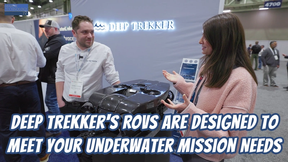Located hundreds and even thousands of meters deep, vast deposits of precious metals and other marketable minerals are closer to being explored. Advances in marine geology, hundreds of deposits containing gold, silver, cobalt, lead and zinc, valued at trillions of dollars, have already been identified under the seabed, usually around fumaroles (hot gas fountains of volcanic origin). These are spread out along more than 73 thousand kilometers of underwater fissures on the earth´s crust.
This interest has already come to the attention of environmentalists and environmental organizations as these locations are usually populated by unique species that live along the borders of the fumaroles, due to the heads and chemical elements that emanate from these underwater chimneys. These species were basically unknown to man up to the 70´s when the first fumaroles were discovered and still little is known about most of them, while new species are still being detected.
Known as polymetallic sulfides, due to the sulfur in its chemical composition, these mineral reserves are being discovered in an accelerated rhythm, since the creation of the ISA (International Seabed Authority), an autonomous organization linked to the United Nations and headquartered in Kingston, Jamaica, that is responsible for regulating underwater mineral exploration following the United Nations Convention about laws of the sea of 1982. ISA decided to prioritize the creation of rules governing the concession of authorizations for its mining established in 2010. Before that ISA had formalized only 10 concession contracts in 15 years of polymetallic nodule exploration. Last month five new concessions were approved by the ISA.
Below is the official release from the ISA pertaining to these new concessions:
ISA Council Approves Five New Applications for Exploration
KINGSTON, JAMAICA, 23 July 2012
The workload of the International Seabed Authority is set to increase dramatically with the approval, by its Council in Kingston this afternoon, of five new plans of work for exploration of marine minerals in the deep oceans.
Approval of the plans brings the number of active exploration contracts issued by the Authority to 17, compared to only eight in 2010.
The action of the 36-member Council followed the recommendations of the Legal and Technical Commission, the Authority’s expert body, in a report presented this morning.
In a debate on the applications, the Council indicated that its decision would contain wording to indicate to contractors that they would be liable to assume costs related to the ongoing management of contracts, pursuant to Regulation 30 - Periodic review of the implementation of the plan of work for exploration.
The applicants are listed below in the order they were received by the Legal and Technical Commission):
a. Government of the Republic of Korea (submitted 21 May 2012)
b. Institut français de recherche pour l’exploitation de la mer (IFREMER) (submitted 23 May 2012)
c. UK Seabed Resources Ltd. (submitted 23 May 2012)
d. Marawa Research and Exploration Ltd (submitted 30 May 2012)
e. G-TEC Minerals Resources NV (submitted 31 May 2012)
The Republic of Korea and IFREMER submitted applications to explore for polymetallic sulphides while UK Seabed Resources Ltd, Marawa Research and Exploration Ltd and G-TEC Sea Minerals Resources NV from Belgium, applied for approval for the exploration of polymetallic nodules.
Claudio Paschoa
• deepwater
• environmentalists
• exploration
• fumaroles
• isa
• mining
• nodules
• polymetallic
• species
• sulphides
Paschoa, Claudio
Claudio Paschoa is Marine Technology Reporter's correspondent in Brazil.
Email: [email protected]














 December 2025
December 2025



